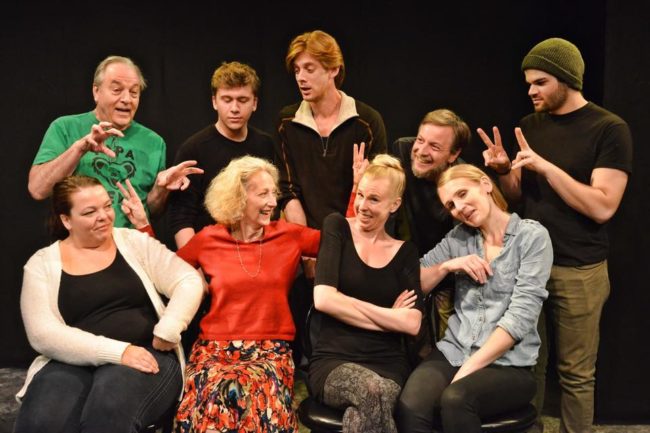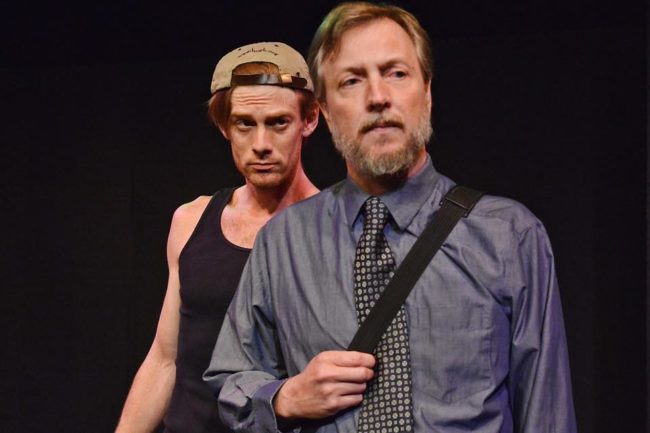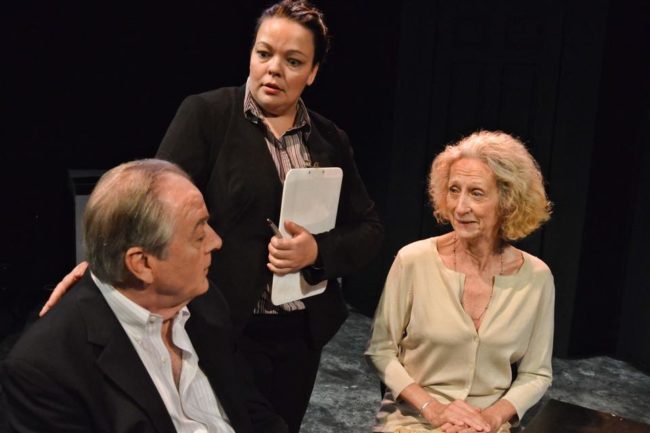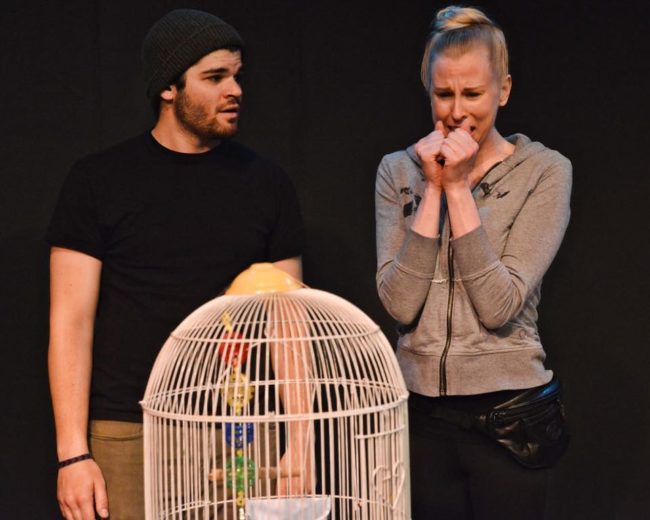Ten actors. Ten plays. Ten minutes. One stage. It’s happening right now in a theatre near you— the Fells Point Corner Theatre, to be exact. Appearing as a new revision to their annual tradition of a 10-minute play festival, this year four directors take ten actors across the course of ten different ten-minute one-act plays. Polished, poignant, and perfectly humorous, this bundle of shorts is perfectly palatable for those who prefer their theatre in quippy clips and devourable morsels. Directors Howard Berkowitz, Steve Goldklang, Alexander Scally, and Michael Byrne Zemarel lend their seasoned directorial expertise to these exciting new works and the result of their sharp focus is a delectable evening of a decade (yes, apparently even outside of years a grouping of ten is a decade) of impressive new works more than ready for their world premieres.

Universal praise should be given to Lighting Designer Charles Danforth III and Sound Mixer Andrew Porter as the pair provide illumination and auditory enhancement for all ten scripts. Porter also created the open versatility of the set design, focusing on a minimalist approach to ease the transition from show to show. While a few props are necessary to help distinguish locations between each show, the simplicity and ease of scenic shift is much appreciated as it keeps the evening’s overall pacing moving swiftly. Danforth’s lighting is equally simple but not without focus and keen placement for certain plays. There are subtle cues, particularly during Compos Mentis, that shift location within the play as well as delineate time of existence, like the low-lighting featured in For the Foot of a Hill.
Jump by Andrea Carey
Directed by Steve Goldklang, Jump is a two-handler featuring a man posed on a bridge prepared to discard the great gift of life when he finds himself interrupted by a wandering street vagrant. Playwright Andrea Carey has a surprising and bizarre balanced juxtaposition of severity and levity on display in the script of Jump. Taking the heavy notion of jumper’s suicide and flushing it against the darkened humors of a gritty female character (executed flawlessly by Helenmary Ball), Carey shows a marvelous mirth even in the darkest hour. Clean dialogue exchanges as well as a heightened sense of characterization puts the bigger picture in perspective. Carey focuses on the notion that no one’s problems are trivial to them, regardless of how they stack up against the rest of the world.
Ball, playing the salty, gritty streetwise woman, is well matched against Gareth Kelly, playing the miserable man at the end of his rope. The humorous barbs spit between them unearth a deeply unsettling comedy in light of the present situation, which is mainly that Kelly’s character is on the precipice of jumping to end his life and Ball’s character all but pushes him from the bridge with her antagonizing banter. The moments of truthful confession create a striking comparison to the more absurd moments of laughter in this performance, and the way the pair handles the twist of an ending leaves the audience gasping in shock.
Henry by Mario Correa
Directed by Michael Byrne Zemarel, Henry is a scenario the audience is all too familiar with: ex-lovers accidentally crossing paths in a public place and finding themselves trapped into small talk. Correa’s two characters of Lucy (Holly Elizabeth Gibbs) and John (David Shoemaker) could be any couple on any street in modern-day America. The universality of his script makes the comedic discourse between the ex-couple that much more relatable to the audience. The deliberate sub-textual emotions Correa pens into Lucy’s rants are where the bulk of the script’s humor is found, and naturally so, free from contrivance. The twisted ending is another emotional slap to the audience (two in a row after the shocking twist ending from the first play of the evening) but one that feels vindicated by the build-up between the characters over the course of their exchange.
Gibbs runs away with the show between her vivid facial expressions and spastic vocal outbursts. Mining the character’s text for every tension-driven, emotionally-charged moment, she works Shoemaker’s character over into a fine pulp. Holding his own against the bombastic character that Gibbs portrays, Shoemaker manages to have the perfect responses to being set upon in those all-too-familiar awkward moments of handling the melodramatic borderline psychotic ex-girlfriend who clearly has active hang-ups over the end of the relationship despite time having passed and his character of John having moved forward.
When I Fall in Love, It Will Be… by Susan Middaugh
Directed by Alexander Scally, this touchingly sentimental play features two seniors coping with their respective spouses who are now residing in an assisted living facility for patients with Alzheimer’s. Susan Middaugh’s script is profound and stirring, a piece that delicately tugs at the heartstrings while coaxing a tender tear to the eye. Her convivial fabrication of Florence (Dianne Hood) and Ed (Peter Wilkes) is as natural as a warm summer’s day; the conversational flow between them springs from this natural construction like honeysuckle in bloom, gently and fragrantly. The natural build of conversation is touching and lightly humored, overall Middaugh’s work is a perfect expression of the struggles faced by those coping with loved ones who have fallen victim to Alzheimer’s.
Hood and Wilkes play exceptionally well together in this play, both delivering earnest characters in the short spans of time allocated to the play. Their conversational tones as well as spatial relationship, under Director Alexander Scally, perfectly fit the words that Middaugh has penned. There is a seriousness, an unnerving woe and sense of melancholy that drives Hood’s performance, whereas Wilkes’ portrayal of Ed comes from a place of acceptance and choosing to find the silver lining of hope in a grim and otherwise bleak situation. Tragically beautiful in its essence, the play is well suited to both performers.
Monument by Mark Scharf
Directed by Howard Berkowitz, this autobiographical piece based on real life events is a brutally emotional investment that at first glance appears to be little more than an exploitation of two differing social classes of people used to transport the playwright’s beliefs on life and its purpose. However, on closer examination, this intricately nuanced work is a deeply meaningful and emotionally blindsiding personal tribute that feels like an excerpt from a much larger work. Mark Scharf sets Scott (David Shoemaker) and Mark (Gareth Kelly) as two ordinary characters— a playwright and a roofer— whose banter is mirthful but banal in the sense that it’s mindless, right up until the measure of life is factored into their exchange. Scharf’s ability to quickly transform something resting easily on the surface into a much more emotionally harrowing depth is impressive. The gut-punch to the audience three-quarters of the way in is unfathomable and yet fits perfectly into the world Scharf has constructed.

Shoemaker and Kelly master these characters as if they’d lived with them all of their lives. Kelly has a firm handle on the slower, more deliberate patois of the playwright character, right down to the zippy self-acknowledged arrogance of his ego. Shoemaker’s tongue gets quite the workout moving at a breakneck pace, serving as a polar opposite against the more languidly inclined character Kelly represents. Their exchanges exist in earnest, following flawlessly along with the impressively crafted writing, which takes the basic dramatic element of writing a play and turns it into theatrical magic, with a tribute to a lost friend blended effortless into the mix.
Opportunity Knocks by Richard Pauli
Directed by Alexander Scally, Richard Pauli’s two-handler is an absurdist laugh-a-minute scenario embedded in the heart of corporate America that has the audience in stitches over the ridiculous stereotypes actualized between the CEO Mr. Bigston (Zarah Rautell) and Ms. Smalley (Holly Elizabeth Gibbs.) Relying heavily on the gender inequality of corporate America (as indicated by the punchy lines “…even though you’re a woman…”) Pauli boldly satirizes the inner workings of a big nameless company in a marvelously madcap exchange between the big boss and the peon worker.
Rautell plays the character of Mr. Bigston razor straight, making him imposing, intimidating, and just plain frightening. This evokes a series of hysterical responses for Gibbs as the meager and timid Ms. Smalley. Both actresses utilize their physicality to further expound upon the character traits that best befits their namesakes, with Gibbs using her wrung hands and Rautell her rigidly strict posture to serve as visual cues. Gibbs’ vivid facial expressions again come to her aid in this performance, serving as a perfect foil for Rautell’s stoic deadpan delivery. Hilarity ensues over the dialogue exchange between the pair, and the comedy that results is the perfect segue into the intermission.
For the Foot of a Hill by Justin Lawson Isett
Directed by Michael Byrne Zemarel, this mostly two-handler (the arrival and expression of a single line by David Shoemaker at the show’s conclusion is profound) is the only piece in the collection of ten to take place outside of modern day. Set in 1914 Germany on Christmas Eve, a British Soldier (Zack Bopst) finds himself face to face with a German Soldier (Tim Neil) during the holiday ceasefire. Poetically striking, Isett’s piece feels as if it is an excerpt from a larger work. Glancing into the private life of a soldier torn about his placement in life and his feelings on war, Isett extrapolates the emotional turmoil of the English soldier with striking clarity. The setup is pristine, the exchange divine; the work is moving and heartfelt despite its brief nature.
Both Bopst and Neil deliver strong and well-maintained accents, English and German respectively. Though Neil’s character says precious little, his attention to what is being said by Bopst’s character is rapt, even if he can’t understand all of the English words. Bopst’s delivery is striking, welling up from a gnarled pit of emotions deep in his gut. The way his tongue flows fluidly over the lurid poetic imagery that Isett has penned into his rant of why men at war are what they are is both stirring and harrowing.
Compos Mentis by Marilyn Millstone
Directed by Steve Goldklang, this witty and brilliantly lighthearted script by Marilyn Millstone is a cheeky look at an aging couple who aren’t quite ready to submit to the life of the down-and-out. Pushed by their daughter into filing their application for “Silver Glades Independent Senior Living Condominiums”, Mrs. Langford (Dianne Hood) and her husband Robert (Peter Wilkes) find themselves facing a much-too-chipper intake assessment in the hands of Patricia (Holly Elizabeth Gibbs), the facility’s equally chipper representative. Hilarity ensues in a touching, feel-good, and overall heartfelt slice of life comedy that is just too precious for words.

Hood and Wilkes find themselves once again paired off, though this performance has a much more jovial tone to it than their first script in 10x10x10. Their adoration for each other, particularly in the last few seconds of the play, warms the heart just to watch. Hood has a naturally sarcastic edge that quips along out of her mouth with ease, both during her solo moment off to the side of the stage and when interacting with the much too pleasant Patricia (Gibbs’ character.) Gibbs puts the forced plastic of a cheerily programed facility worker firmly into place, both on her lips and out of her mouth, making some of the more engaging exchanges with Hood’s character an absolute riot.
Eat Your Greens, and Other Commandments by Alice Stanley
Directed by Alexander Scally, this punchy and poignant family drama by Alice Stanley takes a unique approach to its expression by way of layered construction in the narrative. Introducing Jenny (Barbara Madison Hauck) as a narrative translator to the conversations that are about to unfold over the dinner table between Mom (Zarah Rautell), Dad (Gareth Kelly), and son Tyler (Tim Neil), Stanley primes the audience for the slew of controversial topics about to be unearthed in their work. Riveting and unapologetically, Stanley addresses the white elephants in the room that are all too often glossed over by parents when their children cry out for help in conversation at the dinner table. The most profound quote of the evening’s discourse of the ten plays comes from Stanley’s work: “…not all of me is allowed at family dinner…” and the implications that come with that line are truly haunting.
Hauck and Neil are the primary players in this script of four, where Hauck’s serious attitude drives the momentum of the performance from the very beginning. The dynamic created between Neil’s characters and his parents, Rautell and Kelly, is the epitome of dysfunctional between misunderstood children and their uncomprehending parents. All four performances are grounded with a sense of severity; Rautell and Kelly’s performances based in their need to turn a blind eye to what’s really happening and Hauck and Neil’s performance rooted in needing to be heard. Stanley’s work is innovative and progressively driven by these four performers, with the final moment leaving a resonating blow of profoundness in the audience.
Whatlaw by Tavish Forsyth
Directed by Michael Zemarel, this one-man show written by Tavish Forsyth is a curious stream of conscious play that explores the compounded notion of OCD inside the overactive mind of a Man (David Shoemaker.) As a stream of conscious rant that borders on psychobabble, Forsyth’s work is constructed with surprising clarity. Expressing the way a brain warped by OCD tendencies can explore unfathomably dark depths, Forsyth expounds upon a plethora of experiences using the man as his vessel of experience. Poetic in places, like the descriptors used to facilitate the imagery behind the notion of “the sublime”, Forsyth’s work is a disarming experience that stimulates and numbs the mind simultaneously.
Zemarel’s direction of the piece results in heavy usage of pantomime, which is somewhat distracting from the text that’s being delivered. Shoemaker goes through an elaborate gesturing process of making himself coffee and a sandwich, but at times the gestures aren’t clear enough to properly express the obsessively compulsive neurotic behavior which he is experiencing. That said, Shoemaker delivers a stellar on-going monologue which traverses multiple emotional levels as each new occurrence is experienced by his character, pulling the audience along for the ride as he jumps from tangent to tangent.
Babo and the Bird by Pete Taylor
Directed by Howard Berkowitz, this ridiculous bit of feathery fluff is the perfect ending to the decade of plays featured over the evening. Starring Zack Bopst as Herb and Barbara Madison Hauck as June, Taylor’s script goes haywire over a missing parrot, a grody birdcage, and a hysterical argument of “who’s to blame” regarding the whole messed-up situation. Hysterical and packed with shenanigans that potently pepper the dialogue, this script is hands down the funniest of the bunch.

Clever with the characterizations, Bopst lays into the meathead stupidity of Herb and totally checks out when it comes to mental acuity. Hauck is hopped up on the character’s inherent whininess, going so far as to nasally affect her voice and pitch it an octave up into a shrill falsetto. Their hyper-animated characterizations, particularly the campiness of their argument, are sheer comic gold. Throw in Berkowitz’ guidance to the point-to-point verbal fight— complete with physical body gestures and dog-clickers— and you’ve got an uproarious ten-minute play that delivers laugh after laugh to the audience. Hauck’s perpetual collapsing body is another point of hilarity in addition to the madcap comic ending of the play.
Conclusion
With an impressively polished feel to each of the scripts, sound performances across the board, and an overall comedic appeal, the evening’s ten plays are simply delightful. Tickets are selling quickly with at least one performance already completely sold out so do not hesitate to get your seat for Baltimore’s most promising upcoming new works as FPCT closes out its season of “Fire in the House.”
Running Time: Approximately 2 hours with one intermission
10x10x10 plays through June 12, 2016 on the Sokal Stage at the Fells Point Corner Theatre— 251 S. Ann Street in historic Fells Point of Baltimore, MD. Tickets can be purchased at the door or in advance online.

